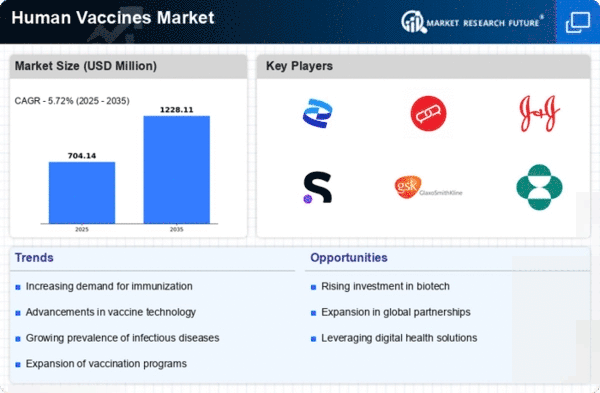Market Trends
Key Emerging Trends in the Human Vaccines Market
The Human Vaccines industry is driven by dynamic movements that capture medical science progress, public health priorities and global spikes. The technological breakthroughs in the development of vaccines, such as mRNA and vector-based technologies are entirely revolutionizing this field. These technologies allow the prompt design and manufacture of vaccines, as shown in COVID-19 vaccine development speedily. Generally, the importance of immunization programs is growing worldwide to prevent existing diseases. Both governments and international bodies are increasing spending on widespread vaccination programs, thus supporting vaccine demand growth. New infectious diseases such as the virus of Zika, Ebola and influenza pandemics have emerged which has stimulated research and development for vaccines against these infections. The market is seeing an increasing trend toward more aggressive initiatives in terms of vaccine preparedness. There is also a significant move towards vaccine personalization, especially in the cancer immunotherapy research area. Personalized cancer vaccines based on tumor characteristics and individual-specific have gained popularity, representing a hope for numerous cancers. The COVID-19 pandemic has brought the need for global vaccine equity into focus. Intensified attempts to create a balanced distribution of vaccines, particularly in the developing countries have become trendsetter for market. Joint ventures and collaborations in technology transfer, as well local manufacturing is gaining ground. The pharmaceutical companies and research institutes are investing more heavily in vaccine R & D. The scope expands from infectious diseases to include therapeutic vaccines for Alzheimer’s disease and autoimmune disorders, thereby enlarging the human vaccine market. Overlapping of vaccine technologies with other therapeutic techniques including gene therapy and immunotherapy is a key characteristic. This interdisciplinary approach is highly promising in tackling weighty medical challenges and an increase of the areas where vaccines are applicable. The success of mRNA platforms in the development of COVID-19 vaccines has promoted research into wider areas. In the meantime, continuous scientific studies are investigating mRNA as a vaccine against several infectious diseases and even an intervention platform beyond classic vaccination. With more global travelling in the recent times, requirements for travel vaccines that guard against endemic diseases of regions are on a rise. This trend is as a result of both casual travel and mobile workforce that changes borders. The provision of vaccination is also being influenced by the digitization of healthcare. In this light, digital tools such as the electronic health records and vaccine passports are increasingly being used to track efficient delivery of vaccines.


















Leave a Comment